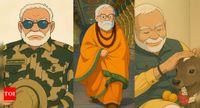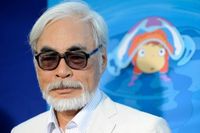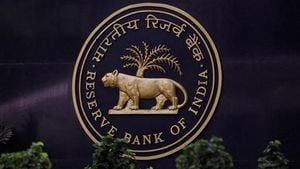NEW DELHI: Prime Minister Narendra Modi has stepped into the world of Studio Ghibli-inspired art, as the Union government on Friday shared a series of AI-generated portraits reimagining key moments from his tenure in the distinctive Japanese animation style. Sharing 12 Ghibli-style images on social media platform X, the government captioned them, "Main character? No. He's the whole storyline. Experience New India in Studio Ghibli strokes." The artwork transforms iconic scenes from Modi’s political career into whimsical, pastel-colored frames reminiscent of legendary animator Hayao Miyazaki’s films.
Among the AI-crafted images are scenes depicting Modi’s meetings with world leaders, including US President Donald Trump and French President Emmanuel Macron. Other portraits show him in an Indian Army uniform, posing with the Tricolour, and standing before the 'Sengol'—a historic sceptre installed in the new Parliament in 2023. The series also captures PM Modi’s engagement with national infrastructure and defense. One image reimagines his sortie in a Tejas Twin Seat Light Combat Aircraft, while another places him beside a Vande Bharat train. The collection further highlights moments like his Maldives visit and participation in the Swachh Bharat Abhiyan cleanliness drive.
Meanwhile, PM Modi isn’t the only politician swept up by the Ghibli wave. Congress MP Shashi Tharoor also shared AI-generated portraits of himself, confessing he had only just discovered the art form. "I’ve been assimilated into the Ghibli trend!" he wrote, adding that he was "officially Spirited Away" by the viral phenomenon—a nod to one of Miyazaki’s most beloved films.
As AI-generated Ghibli-style images flood social media, an old video of Hayao Miyazaki criticizing AI animation has resurfaced. In the clip, the famed animator called AI-generated work "an insult to life itself," reigniting debates on whether technology can capture the emotional depth of hand-drawn art.
In recent days, social media has been abuzz with the trend of AI-generated images imitating the iconic style of Studio Ghibli – the Japanese animation company responsible for classic films like Spirited Away, My Neighbour Totoro, and Howl’s Moving Castle. Thanks to a new version of ChatGPT, users can transform popular internet memes or personal photos into the distinct style of Ghibli founder Hayao Miyazaki, a renowned critic of AI who has strongly condemned the technology in the past.
However, the trend also highlighted ethical concerns about artificial intelligence tools trained on copyrighted creative works and what that means for the future livelihoods of human artists, as well as ethical questions on the value of human creativity in a time increasingly shaped by algorithms. Miyazaki, 84, known for his hand-drawn approach and whimsical storytelling, has criticized AI's role in animation in the past.
One of the most famous instances was in a 2016 documentary called Never-Ending Man: Hayao Miyazaki. In the documentary, a group of developers showed Miyazaki a crude AI-generated animation demo of a zombie that could be used for a video game. The person demonstrating the animation, which showed a writhing body dragging itself by its head, explained that AI could “present us grotesque movements that we humans can’t imagine.” That prompted Miyazaki to tell a story. "Every morning, not in recent days, I see my friend who has a disability," he said. "It’s so hard for him just to do a high five; his arm with stiff muscle can’t reach out to my hand. Now, thinking of him, I can’t watch this stuff and find it interesting." Miyazaki added: "Whoever creates this stuff has no idea what pain is whatsoever. I am utterly disgusted… I strongly feel that this is an insult to life itself."
The viral AI trend has been shared across various social media platforms, with the White House posting its version of the craze on Thursday (27 March) which has drawn widespread criticism. The White House used the tool to illustrate a picture of a 36-year-old woman from the Dominican Republic, crying after being arrested by ICE. Although the image has been viewed more than 45 million times on X/Twitter, many have called the post "evil" and "ghastly." This isn’t the first time that Studio Ghibli-inspired AI has caused controversy. In October, an AI-generated trailer of the 1997 film Princess Mononoke sparked backlash after going viral on social media.
As the debate around AI-generated art continues, it raises fundamental questions about the intersection of technology and creativity. While some embrace the novelty of AI art, others remain wary of its implications for traditional artistry.





